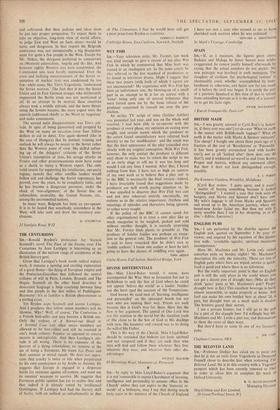THE CENTURIONS
S1R,—Ronald Bryden's preference for Vernon Scannell's novel The Face of the Enemy over The Centurions by Jean Larteguy is interesting as an illustration of the narrow range of acceptance of the British literary gent.
Given that Lart6guy's book needs radical topiary work, it remains a moving and exciting exploration of a great theme—the dying of European empire and the Prsetorian-Guardism that followed the central collapse of will in Paris, London, Brussels and The Hague. Scannell on the other hand describes in desiccated language a limp courtship between limp and dim people in the dim milieu of Paddington- Bayswater; it's as familiar a British phenomenon as a sterling crisis.
Yet Bryden naps Scannell and scorns Lart6guy. And I prophesy that fellow union members will do likewise. Why? Well, of course, The Centurions is a French best-seller and may become a British one. Only the authors of A Burned-out Head or A Severed Case and other union members are allowed to be best-.ellers and still be received in one's book column. Popular as opposed to coterie success is unforgivable. And then Larteguy's atti- tude is all wrong. There is no exposure of the horrors of a dying colonialism, no remorse at the sin of being a European. He treats Les Para,s and their enemies as moral equals. He does not appre- ciate that cruelty is twice as vile when perpetrated by his own countrymen as by Arabs or Asiatics. He suggests that Europe is engaged in a desperate battle for existence against all-comers, and must use its enemies' weapons to survive. He suggests that European public opinion has yet to realise this; and that indeed it is already rotted by intellectual Quislingism. If Lart6guy had had the literary skill of Sartre, with an outlook so unfashionable as that of The Centurions, I fear he would have still got a poor press from Bryden et confreres.
CORRELL! BARNETT
Cat bridge House, East Carleton, Norwich, Norfolk


































 Previous page
Previous page